PCVs Booted from Sierra Leone by the Peace Corps for Smoking Marijuana
Late last March approximately sixty plus of the seventy plus PCVs currently in-country in Sierra Leone were sent home from Freetown by the Peace Corps Office of the Inspector General for smoking marijuana in-country.
Much of the information I have received is from two Sierra Leone RPCVs currently back in-country visiting their host county.
A group of approximately 15 PCVs were partying on Bureh Beach outside of Freetown and were smoking pot, at least according to a woman working for the U.S. Embassy. She reported the PCVs to Peace Corps Washington and they sent an agent out from the Peace Corps Inspector General Office to investigate.
According to the RPCV, who served in the early days in Sierra Leone and were in Freetown, this IG agent, demanded that all the PCVs, approximately 74, come to Freetown by the next day. Of course, given their remote locations and limited transportation, most PCVs couldn’t reach Freetown in one or two days.The IG agent, never having been a PCV, or lived in Africa, didn’t understand this.
Once they arrived in Freetown, an RPCV friend told me, “This IG agent threatened and intimidated all of them. The PCVs were given two choices – either leave the country in 7 days or face prosecution back in the States. One Volunteer asked if he could have a lawyer present and was told he couldn’t. The IG agent posted photos of all the PCVs in-country and integrated the Volunteers, demanding that they tell him the names of any Volunteers in the country who did smoked marijuana.”
As another Sierra Leone RPCV told me by email, “John, what happened in Sierra Leone really sucks. I think the IG person should be reprimanded or sacked for the way he handled this situation. His behavior was reminiscent of Gestapo or KGB techniques. Sarge must be spinning in his grave.”
I am also told—by Sierra Leone PCVs– that Country Director Penny Alexander, while not an RPCV, was nevertheless supportive of the PCVs being interrogated by the IG official. She was, however, unable to control his behavior and stop his method of integration. A real Nazi type, I guess.
The current number of PCVs in Sierra Leone now is approximately 15.The next group of Trainees arrive this coming June.
Times are changing. When I was a PCV in Ethiopia we had a good Volunteer sent home because he was a homosexual and that turned up on his FBI check. (All Volunteers were investigated by the FBI, back in the day.)
Just a few years ago, Peace Corps Director Carrie Hessler Radelet (Western Samoa 1981-83) sent a warm welcoming letter to all the new gay PCVs who were joining the Peace Corps as couples and going off to serve overseas. Today we have eleven states where marijuana is legal. But not yet at the federal government level.
Here’s another IG story, unrelated to Sierra Leone, or the current Inspector General, Kathy Buller. Back when I was the Manager of the New York Peace Corps Recruitment Office, another woman Inspector General was pursuing her own staff, taking them up to the top storage room of the Peace Corps Building in Washington and “having her way” with them.
I am not sure how many agents were involved, but one mild mannered bureaucrat resisted her charms and protested her sexual advances and filed a law suit against the woman. She was found guilty, the employee got a huge chunk of money, and retired from the government, moving his wife and himself out of D.C. and to the Wild West, getting away from the women of Washington.
I was also told later by “people in the know” that the Inspector General had a ‘drinking problem” that resulted in such behavior of a federal official. Didn’t Nixon also have a drinking problem? And, I guess, the IG agent who went to Freetown to interrogate the PCVs just has a personality problem.
Welcome to the Peace Corps.




If that was a hard policy, you’d lose about 50% of volunteers. Probably some of the better ones.
Sierra Leone is not the first place this has happened. I know the same thing happened in Senegal, Rwanda, Gambia and other PC posts. I’d be curious if it’s the same IG agent who’s responsible for these abrasive, demeaning and counter productive interrogations because they sound the same across the board. The country directors are caught in a difficult position, but in the cases I am aware of, many (but not all) have chosen to throw the volunteers under bus instead of supporting their volunteers. On the other hand, in the situations I know about, host country staff have been very supportive and sad to see volunteers go. The opacity and harshness of the OIG investigations do not match the seriousness of the alleged offense. Overall it’s just a real shame for the volunteers and the host communities they have been ripped from because of some OIG agents with anger issues and an axe to grind.
James, I think your statement is unfair.
“Overall it’s just a real shame for the volunteers and the host communities they have been ripped from because of some OIG agents with anger issues and an axe to grind”
READ the Peace Corps Manual. Peace Corps has a ZERO Tolerance of Drug Use. The OIG has a legal responsiblity to investigate any charges of drug use.
I see this as the main problem:
Peace Corps Volunteers do not have a contract, spelling out rights and responsibilities. I think that is the problem.
Peace Corps Volunteers serve at the “pleasure of the President”. They are not employees and they are not in the civil service. This authority of the President is passed down to the Country Director, who has tremendous power.
I have argued for years that the status of Peace Corps Volunteers is incompatible with all our laws and our culture. They can just be pawns with little recourse.
At times, I felt as powerless as the very poor people with whom I worked. Options depended on who you knew and who your parents were and much money you had independently. During the time of the Draft, I saw the treat of”early termination” wielded like a weapon against male Volunteers.
This story is all over the place, not only concerning what happened in Sierra Leone, but in the anecdotal “ buckshot” that follows. All Peace Corps staff in Washington and the field should act with the highest degree of professionalism and integrity, as should PCVs. Our policy in Ethiopia (mirroring agency-wide policy, I believe) was that possession or use of a drug that’s illegal in the U.S. will result in termination. The staff did not go looking for violations, and fortunately none came to our attention, but the policy (not how the report describes its implementation in Sierra Leone) is the right one. As a former diplomat, I’ve seen the insides of some horrifying prisons and corrupt justice systems that I would NEVER want a PCV to experience.
Back time comes forward on our tilting/ raked stages where great ships foundered, where our life and death sentences remain unfinished. Coming audiences perhaps may sail-in watching thickening mind scars, memories throbing. Reveries’ wheel rushes in cardinal directions replaying archival photography’s film-frames winding over time’s westerings, voicing minds’ sorrows. O mucus animals of noxious phlegm, remember. If you gag, smile a little too.
© Copyright Edward Mycue Wednesday May 2, 2019 San Francisco CA
What ever happened to the rule that I remember from the early days: Not what’s illegal inside the boundaries of the USA, but rather, and logically, what is illegal or frowned on — within the host country. This excluding any hard drug or conduct which would impair a PCV’s ability to function and represent the US.
I have a great proposal for all those PCVs canned in Sierra Leone. Come to New Mexico and S Colorado, and work in our hospitals and schools, reservation schools, and help with the deluge of asylum-seekers. We want people like YOU ! ! (New Mexico, going back before statehood, never has had a prohibition on pot, and it always was widely, and responsibly, used).
John Turnbull Lower Canoncito New Mexico Ghana-3 Geology and Nyasaland/Malawi-2 Geology Assignment 1963, -64, -65.
I visited the Peace Corps Office in Kathmandu, Nepal (1968) and a sign with large letters indicated that drug users would have their service immediately terminated. Curious if any were caught because Nepal was the haven for European back packers who bought cheap hash, opium and weed. Some PCVs in Ethiopia probably chewed khat, a mild narcotic. A lot of us got drunk several times on warm beer.
See my post below: One of our friends who got the boot, went to live in Kathmandu. On our way home to the States from India, we visited with him. We were walking through the streets on the way to a WT (world traveler) place to crash, when he said, “I need to make a stop. Come with me.” So we entered a small door, and walked up the narrow stairs to a large, open room lined with Steel Case cabinets. Big ones. A small Nepali woman came in and lit a small oil candle wick. Then she opened up one of the cabinets. Holy Moses! That sucker was filled with balls of hash fit for cannon loading. She pulled one out. Heated it a little over the flame, cut off a little bit for our friend to sample. He did. And then bought a marble-sized bit for about 50 cents. We left. He declared it “average,” but he needed to buy something for maintain his connection with her. And THAT was Kathmandu in 1969.
We had two from our group canned for smoking pot. That was in 1968, when in India states that forbid alcohol, forbid weed (in several forms, some for eating, some for smoking). Our state prohibited neither. (Hashish was illegal country wide.) Our town (just up from a village) had a government pot store. When my younger brother and his friend John visited us in the middle of India, they were deliriously happy about not having to singe their fingers on a roach. My site mate and I did not indulge. In anything (except sweets from the bazaar). We drank on vacation, away from the peering eyes of our neighbors. The rule was that if it was illegal in the US, it was illegal for us, local standards be damned. It is very likely that on festive occasions when we shared meals with local hosts that all the food was laced with bhang. So I guess we were all guilty.
I’d like to hear about the most spectacular faux pas committed by PCVs or trainees. As a start I’ll tell you about a group of trainees at Basico (the training contractor) in Costa Rica in the early 1970s. At the time, streaking was a thing on college campuses in the US. So they decided that, while performing skits in front of their host families as a final event of their training, they would all take off their clothes and run across the stage. They were all sent home as soon as they could be put on flights, and somehow the training center survived (I trained there in 1974). Imagine if they had been arrested by local authorities!
My point in telling this is to emphasize that PCVs have to be held to a high standard of conformity to local norms and customs. Otherwise they will not be effective agents of change in heir host countries.
I sympathize with staff about setting rules that fit the planet when cultures are so diverse. Even my coal mining ancestors knew that it’s never a good idea to spit your tobacco juice on your host’s living room floor.
While a PCV in Kenya, it was common knowledge that some male PCVs bought the services of prostitutes in Mombasa. Such activity is illegal in the U.S. Of course, they were never sent home and I doubt that the local PCV office even pursued cases if they were made aware of them. Boys will be boys…???